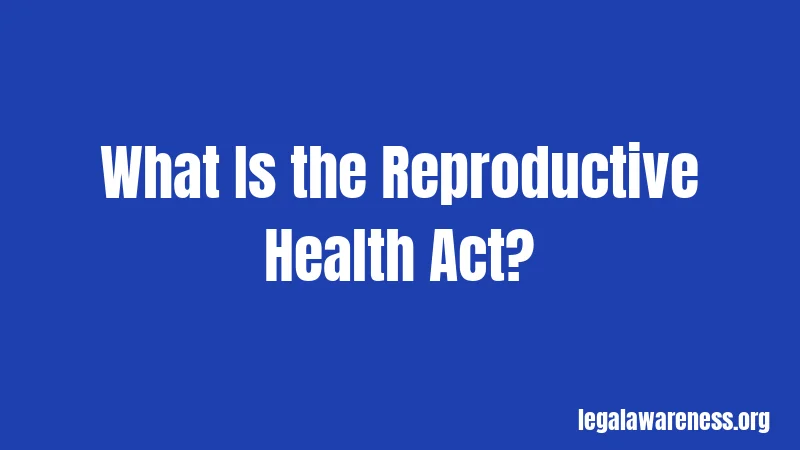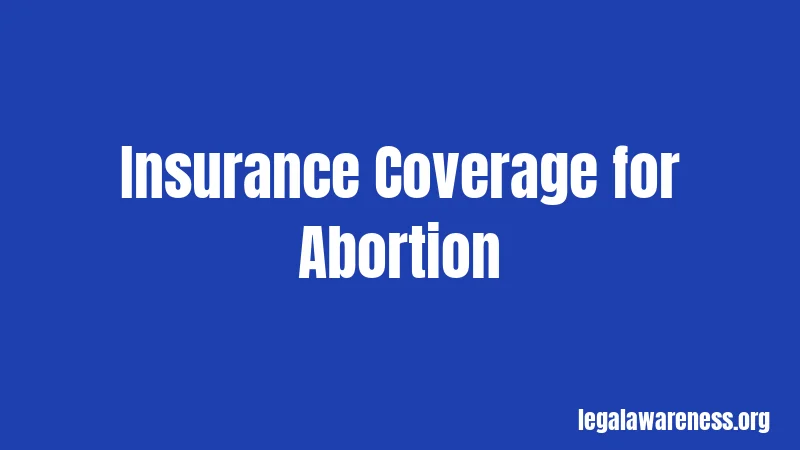Abortion Laws in Illinois (2026): A Safe Haven in the Midwest
Most people don’t realize how different abortion access is from state to state. Seriously. While many states have passed strict bans or near-total restrictions, Illinois has gone the opposite direction. The state has become one of the most protective places in the country for abortion rights.
Here’s the deal. If you’re in Illinois or thinking about traveling there for care, you have strong legal protections. Let’s break down exactly what the law says and what it means for you.
What Is the Reproductive Health Act?

Illinois passed the Reproductive Health Act in 2019. This law makes abortion a fundamental right in the state. That’s a big deal. It means the government can’t easily take it away or add unnecessary restrictions.
The law treats abortion like any other type of health care. No special hoops to jump through. No lectures or extra waiting periods. Just you and your doctor making decisions together.
Sound too good to be true? It’s actually the law.
When Can You Get an Abortion in Illinois?
You can get an abortion in Illinois until fetal viability. That’s usually around 24 to 26 weeks of pregnancy. But here’s something important: viability is determined by your doctor on a case-by-case basis. It’s not a hard deadline written into the law.
After viability, abortion is still legal in certain situations. If continuing the pregnancy threatens your life or health, including your mental health, you can still access care. Your doctor makes that call.
There’s no specific week limit written into the law. Instead, Illinois relies on the medical standard of viability. This gives doctors the flexibility to provide care based on each patient’s unique situation.
No Waiting Periods or Mandatory Lectures

Okay, pause. This part surprises a lot of people.
Many states make you wait 24 to 72 hours between your first appointment and the actual procedure. Not Illinois. There’s no mandatory waiting period. You don’t have to make multiple trips to a clinic.
You also don’t have to listen to state-scripted information designed to discourage you. No forced ultrasound viewing. No mandatory counseling sessions. Your medical provider gives you the information you actually need, and that’s it.
Pretty straightforward, right?
Rules for Minors: No Parental Notification Required
Here’s where Illinois really stands out. If you’re under 18, you can get an abortion without telling your parents. You don’t need their permission either.
This hasn’t always been the case. Illinois used to have a parental notification law. It required doctors to tell a parent, grandparent, or guardian at least 48 hours before performing an abortion on a minor. Governor Pritzker signed a law repealing this requirement in December 2021. It took effect on June 1, 2022.
Now, minors have the same rights as adults. You decide who to tell about your pregnancy and your decision. That choice belongs to you.
The repeal was specifically designed to protect vulnerable young people. Teens in dangerous home situations no longer have to fear being kicked out, abused, or forced to continue a pregnancy against their will.
Insurance Coverage for Abortion

Wondering if your insurance covers abortion? In most cases, yes.
Illinois law requires state-regulated private insurance plans to cover abortion if they cover other pregnancy-related care. The coverage must treat abortion the same as any other medical service. No extra costs. No special restrictions.
Illinois Medicaid covers abortion too. This is a big deal because most states don’t do this. The federal government doesn’t allow Medicaid funds for abortion except in cases of rape, incest, or life endangerment. But Illinois uses state funds to cover abortion for Medicaid recipients without those restrictions.
If you’re uninsured or your insurance doesn’t cover abortion, financial help is available. Organizations like the Chicago Abortion Fund can help cover costs. Some clinics offer sliding scale fees based on your income.
The bottom line: cost shouldn’t stop you from getting care in Illinois.
Traveling to Illinois for Abortion Care
Illinois has become a major destination for people traveling from other states. In 2024, about 35,000 out-of-state patients received abortions in Illinois. That’s nearly 40% of all abortions performed in the state.
The state provides nearly one in four of all abortions for people traveling across state lines nationwide. That’s more than any other state in the country.
Why do so many people come to Illinois? Look at the map. Indiana has a near-total ban. Missouri bans abortion without exceptions for rape or incest. Iowa passed a six-week ban. Kentucky has similar restrictions. Illinois is surrounded by states where abortion is banned or severely limited.
If you’re traveling from another state, you have the legal right to receive care in Illinois. The state’s shield laws protect you, which brings us to the next important topic.
How Illinois Protects Patients and Providers
Hold on, this part is important.
Some states are trying to punish people who travel elsewhere for abortions. They’re also targeting providers who help out-of-state patients. Illinois has passed strong laws to prevent this.
The state’s shield laws do several things. First, Illinois authorities cannot share information with other states investigating abortion care. No cooperation with out-of-state subpoenas, summons, or legal actions related to legal health care in Illinois.
Second, Illinois won’t extradite anyone for providing or receiving abortion care that’s legal in the state. If another state wants to prosecute you for getting an abortion in Illinois, the state won’t hand you over.
Third, health care providers are protected from losing their licenses. Even if another state tries to take disciplinary action against a doctor for providing abortion care in Illinois, that discipline doesn’t count here.
These protections apply whether you live in Illinois or traveled from somewhere else. Your medical information stays private. Your provider is protected. Pretty reassuring, right?
Types of Abortion Available
You have options when it comes to how you end a pregnancy. The method depends on how far along you are and your personal preferences.
Medication abortion, sometimes called the abortion pill, is available up to about 10 to 11 weeks of pregnancy. It involves taking two different medications. You can often get these through telehealth without an in-person visit. Some virtual providers like Hey Jane serve Illinois patients.
Surgical abortion, also called procedural abortion, is available later into pregnancy. The procedure itself is quick, usually less than 10 minutes. You go home the same day.
Starting in 2025, public colleges in Illinois with health services and a pharmacy must offer both contraception and medication abortion to students. This came from a law Governor Pritzker signed expanding campus access to reproductive care.
Who Can Provide Abortion Care?
Illinois has expanded who can perform abortions. Advanced Practice Registered Nurses and Physician Assistants can provide abortion care within their scope of practice. You don’t necessarily need to see a doctor.
This helps increase access, especially in areas where there aren’t many abortion providers. It means shorter wait times and more options for where you can receive care.
Medical providers can refuse to perform abortions if they have religious or moral objections. But they’re supposed to give you information about where else you can get care. If a provider refuses to help you and doesn’t offer alternatives, that’s a problem.
Emergency Situations
Here’s something that affects everyone, not just people seeking abortions.
Illinois has codified the federal Emergency Medical Treatment and Labor Act into state law. This means hospitals must provide emergency medical care to anyone who needs it. When an abortion is medically necessary to address a life-threatening condition, hospitals must provide that care.
This matters because some states have created confusion about whether doctors can perform emergency abortions. Illinois has made it crystal clear. If you show up at a hospital with a medical emergency that requires ending a pregnancy, you will receive care.
Protection Against Discrimination
A new law took effect on January 1, 2025 that prohibits discrimination based on reproductive health decisions. This includes decisions about abortion, fertility treatments, birth control, and more.
You can’t be fired from your job for having an abortion. You can’t be denied housing. You can’t face discrimination in public places. Your reproductive health decisions are protected under the Illinois Human Rights Act.
If you believe you’ve been discriminated against, you can file a complaint with the Illinois Department of Human Rights. You have two years from the incident to file.
Recent Changes to Illinois Abortion Law
Illinois keeps strengthening its protections. Here’s what’s happened recently.
In August 2024, Governor Pritzker signed three new bills. One codified emergency abortion care requirements into state law. Another expanded the shield law protections. The third added reproductive health decisions to anti-discrimination protections.
In 2025, public colleges were required to start offering medication abortion and contraception on campus.
The state continues to be proactive. Lawmakers aren’t waiting for problems. They’re building protections in advance.
Finding Abortion Care in Illinois
There were 32 clinics providing abortions in Illinois as of 2024. You have options across the state, from Chicago to downstate locations.
Planned Parenthood of Illinois operates multiple health centers. Their Carbondale clinic serves many out-of-state patients, with about 90% coming from other states.
Before choosing a provider, watch out for fake clinics. Crisis pregnancy centers often disguise themselves as abortion providers. They don’t actually provide abortion care. They exist to talk you out of your decision. If a place doesn’t clearly state they provide abortions, be cautious.
Resources that can help you find legitimate providers include Planned Parenthood’s website, the National Abortion Federation hotline at 1-800-772-9100, and the Chicago Abortion Fund.
Getting Financial Help
Cost shouldn’t prevent you from getting care. Several organizations can help.
The Chicago Abortion Fund provides money for the procedure itself plus travel, lodging, childcare, and other expenses. They took over 16,000 calls from people in 41 states last year and didn’t turn anyone away.
Planned Parenthood offers sliding scale fees and can help you apply for Medicaid on the same day as your appointment. If you’re an Illinois resident without insurance, you may qualify for same-day Medicaid coverage.
Medication abortion through Hey Jane can cost as low as $0 with Illinois Medicaid or up to $499 out of pocket. Costs vary by provider and gestational age.
Frequently Asked Questions
Is abortion legal in Illinois? Yes, abortion is legal and protected as a fundamental right in Illinois. You can access abortion care until fetal viability, usually around 24-26 weeks, and later if your health or life is at risk.
Do I need parental permission if I’m under 18? No. Illinois repealed its parental notification law in 2022. Minors have the same rights as adults to make confidential decisions about abortion.
Will my health insurance cover abortion? Most Illinois insurance plans, including Medicaid, are required to cover abortion like other pregnancy-related care. Check with your specific plan for details.
Can I travel to Illinois from another state for an abortion? Yes. Illinois welcomes out-of-state patients and has shield laws protecting you from legal action by your home state.
Is there a waiting period before I can get an abortion? No. Illinois has no mandatory waiting period. You can receive care as soon as you and your provider are ready.
Final Thoughts
Illinois stands out as one of the most protective states for abortion rights in the country. The laws here trust you to make your own medical decisions. No unnecessary barriers. No government interference in your private health care.
If you’re in Illinois, you have options. If you’re considering traveling here for care, know that you’re protected. Organizations throughout the state are ready to help with appointments, costs, and logistics.
Knowledge is power. Now you know what Illinois law actually says. If you have questions or need help, reach out to the resources listed above. You’re not alone in this.
References
- Illinois Reproductive Health Act, 775 ILCS 55/1-15 https://www.ilga.gov/legislation/ilcs/ilcs5.asp?ActID=3987
- ACLU of Illinois – Know Your Rights: Abortion in Illinois https://www.aclu-il.org/en/know-your-rights/know-your-rights-abortion-illinois
- Illinois Department of Human Rights – Reproductive Rights Protections https://dhr.illinois.gov/about-us/idhr-news-and-events/2024-12-26-release-re-reproductive-rights.html
- Illinois Legal Aid Online – Abortion Law https://www.illinoislegalaid.org/legal-information/abortion-law
- City of Chicago – Abortion Care Resources https://www.chicago.gov/city/en/depts/cdph/provdrs/healthymothers_and_babies/svcs/abortion-care.html
- Guttmacher Institute – Illinois Abortion Data https://www.urban.org/projects/how-reproductive-health-care-changing-post-dobbs/abortion-access-and-policies-key-states/illinois
